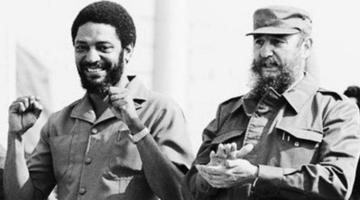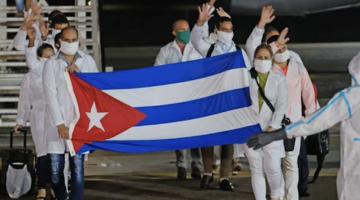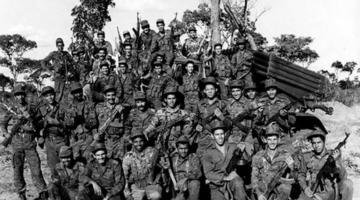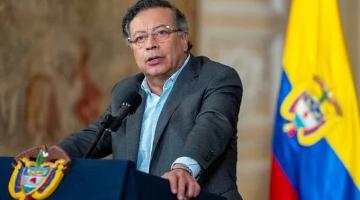Panama's deepening military ties with the U.S. challenge the nation's constitutionally mandated demilitarization.
Originally published in AfroResistance.
Panama City, Panama — Recent developments in Panama's security policies indicate a departure from its longstanding commitment to demilitarization, raising concerns about national sovereignty and renewed U.S. military influence in the region.
Since the disbandment of its military in 1990, following the U.S. invasion to depose General Manuel Noriega, Panama has maintained a policy of demilitarization. This stance is enshrined in Article 310 of the Panamanian Constitution, which explicitly states:
"La República de Panamá no tendrá ejército" ("The Republic of Panama shall not have an army").
For over three decades, Panama has relied on its National Police and other security services to maintain internal order and public safety.
Recent Developments: Military Aircraft Acquisition and Enhanced U.S. Cooperation
In February 2025, U.S. Defense Secretary Pete Hegseth and Panamanian President José Raúl Mulino agreed to expand cooperation between the U.S. military and Panama's security forces. This agreement emphasizes shared security interests, notably the protection of the Panama Canal.
Subsequently, on March 12, 2025, Panama's Cabinet Council authorized the purchase of six aircraft for the National Aeronaval Service (SENAN), totaling approximately $197 million.
This acquisition includes:
-
Four A-29 Super Tucano light attack aircraft from Brazilian manufacturer Embraer, valued at over $78 million.
-
Two C-295 transport aircraft from Airbus Defense and Space, costing more than $109 million.
The government asserts that these aircraft will bolster SENAN's capabilities in aerial patrols, disaster response, and humanitarian assistance.
Implications for Sovereignty and Regional Dynamics
These developments have sparked a debate about Panama's sovereignty and the potential resurgence of U.S. military influence in the region. Critics argue that such agreements could pave the way for a renewed U.S. military presence, reminiscent of past interventions. Furthermore, the investment in military-grade equipment appears to contradict Panama's constitutional commitment to demilitarization.
For organizations like AfroResistance, these issues are of particular concern. Historically, U.S. military interventions in Latin America have disproportionately affected Afro-descendant and Indigenous communities. The potential for increased militarization raises alarms about the marginalization and criminalization of these communities under the guise of security operations.
Moreover, U.S.-based organizers and advocates for racial and social justice should remain vigilant. The patterns of militarization and foreign intervention observed in Panama could have broader implications for U.S. foreign policy in the region, potentially influencing domestic policies related to policing and community relations.
In light of these recent developments, AfroResistance and allied organizations are demanding transparency and accountability from both the Panamanian and U.S. governments. Militarization has historically led to increased repression, human rights violations, and the criminalization of Black and Indigenous communities across Latin America and the Caribbean. The renewed U.S. military presence in Panama, along with the government’s investment in military-grade equipment, contradicts the country’s constitutional commitment to demilitarization and risks deepening racial and economic injustices.
AfroResistance calls for:
-
Full disclosure of the details of the February 2025 U.S.-Panama military agreement and an immediate review of its implications for Panamanian sovereignty and human rights.
-
A halt to Panama’s militarization—including the cancellation of the $197 million military aircraft purchase, which diverts critical resources away from education, healthcare, and infrastructure.
-
An end to U.S. military presence and intervention in Latin America and the Caribbean, which has historically led to destabilization, displacement, and repression of racialized communities.
-
Investment in community-led security strategies that do not rely on militarization but instead prioritize economic and social justice, conflict resolution, and sustainable development.
-
Commitment to a Demilitarized Latin America and the Caribbean – We demand that Panama and all nations in the region honor the 2014 CELAC declaration of Latin America and the Caribbean as a “Zone of Peace.” This means governments must commit to resolving conflicts without military intervention or foreign interference and reject policies that invite U.S. military presence or deepen militarization. We call on organizations, activists, and policymakers to endorse this demand through the Black Alliance for Peace’s Zone of Peace campaign, which advocates for the expulsion of colonialism, patriarchy, capitalism, and all forms of imperialism from the region. Signing onto this demand means standing for sovereignty, self-determination, and the protection of Black and Indigenous communities from militarized violence.
The international community, particularly Black and other organizers of color in the U.S., must recognize that what happens in Panama is not isolated. U.S. militarism abroad is deeply connected to the over-policing, surveillance, and criminalization of Black and Brown communities in the United States. The struggles against U.S. military expansion, imperialism, and state violence are interconnected—and so must be our resistance.
Panama stands at a crossroads. It can remain a leader in demilitarization and sovereignty, or it can fall back into the cycle of U.S. military dependence. The world must pay attention, and we must act now.
Janvieve Williams Comrie, is a sociologist, a human rights strategist and a movement facilitator. She is the founder and current Executive Director of the international organization AfroResistance. A sought after consultant, speaker and certified personal coach, Janvieve has strategized, advised and worked with a myriad of people all over the world, including heads of states. www.janvieve.com.


















